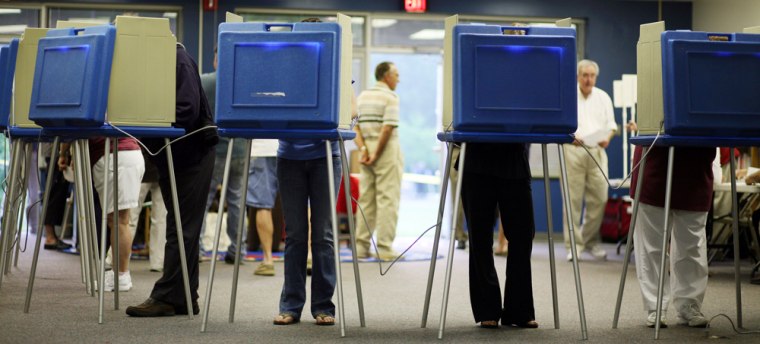Race again played a pivotal role in Tuesday's Democratic presidential clashes, as whites in Indiana and North Carolina leaned solidly toward Hillary Rodham Clinton and blacks voted overwhelmingly for Barack Obama, exit polls showed. Half the voters said they were influenced by the focus on Obama's former pastor, the Rev. Jeremiah Wright.
Obama, the Illinois senator battling to become the first black president, again failed to make an appreciable dent in a crucial voting bloc that has consistently eluded him — working-class whites.
According to preliminary results from the exit polls, two-thirds of whites in both states who have not completed college were supporting Clinton, which the New York senator could use to fortify her argument that she would be the stronger Democratic candidate in the November general election. Of 28 states that have held primaries in which she and Obama competed before Tuesday, Clinton had prevailed with working-class white voters in 25.
Wright was a looming factor in the voting, with half in each state saying he was important in choosing a candidate. Of that group, seven in 10 in Indiana and six in 10 in North Carolina backed Clinton. Those discounting him as a factor heavily favored Obama. In North Carolina, Obama got more votes from people saying they discounted the Wright episode than Clinton got from those affected by it.
Among whites, eight in 10 in both states who said Wright affected their choice went with Clinton. That was well above the six in 10 whites overall who supported her.
In both states, two-thirds of Clinton's white voters said Wright was important. That compared to eight in 10 white Obama supporters who said Wright was not a factor.
Wright has said the U.S. government may have developed the AIDS virus to infect blacks and that the U.S. invited the Sept. 11 terrorist attacks. Obama denounced the remarks last week.
Obama weak again with working-class whites
The six in 10 whites in both states supporting Clinton were similar to her margin over Obama among whites nationally so far, showing he continues to have trouble cutting into her support from those voters.
Obama's poor performances among working-class whites could prove troubling for him as he attempts to win over top Democratic officials, the superdelegates, who may decide who gets the party's nomination. Clinton has argued that her strength with this group makes her the stronger candidate for the fall campaign. Obama's campaign argues he will do well with those voters in November once he contrasts himself with the Republican candidate, John McCain.
Nine in 10 blacks in both states were backing Obama — a typical margin for him. That proved decisive in North Carolina, where they comprised about a third of voters — double their proportion in Indiana.
In another troubling sign for Obama, he and Clinton were running about even among independents, a group he usually wins.
Although Clinton had her usual lead among Catholics in Indiana, she and Obama were dividing them about equally in North Carolina. Obama also had an edge in both states among first-time primary voters, underscoring his continued ability to draw new voters to the polls.
North Carolina was clearly Obama's stronger state, and that showed among many groups of voters. He was leading there among young voters, college graduates and those earning more than $100,000 a year.
Clinton's performance was far stronger in Indiana.
It's the economy
She was making a robust showing there among white men, a group she and Obama have split about evenly but whom she won handily in Pennsylvania and Ohio. She and Obama were about equally dividing the votes in Indiana of whites under age 30 and people earning at least $100,000 a year, groups that usually have leaned toward Obama.
In both states, whites who said race was an important factor were favoring Clinton, as they have before. Older voters were also solidly behind her as usual.
Voters in both states overwhelmingly named the economy as the nation's top issue. While voters most concerned about the economy and who said they were affected by it were narrowly backing Clinton in Indiana, they were supporting Obama in North Carolina.
The preliminary results were from exit polling by Edison Media Research and Mitofsky International for The Associated Press and television networks conducted in 35 precincts in each state.
The data was based on 1,738 people voting in Indiana's Democratic contest and 2,271 people in North Carolina, with a margin of sampling error of plus or minus 4 percentage points in Indiana and 3 points in North Carolina.
